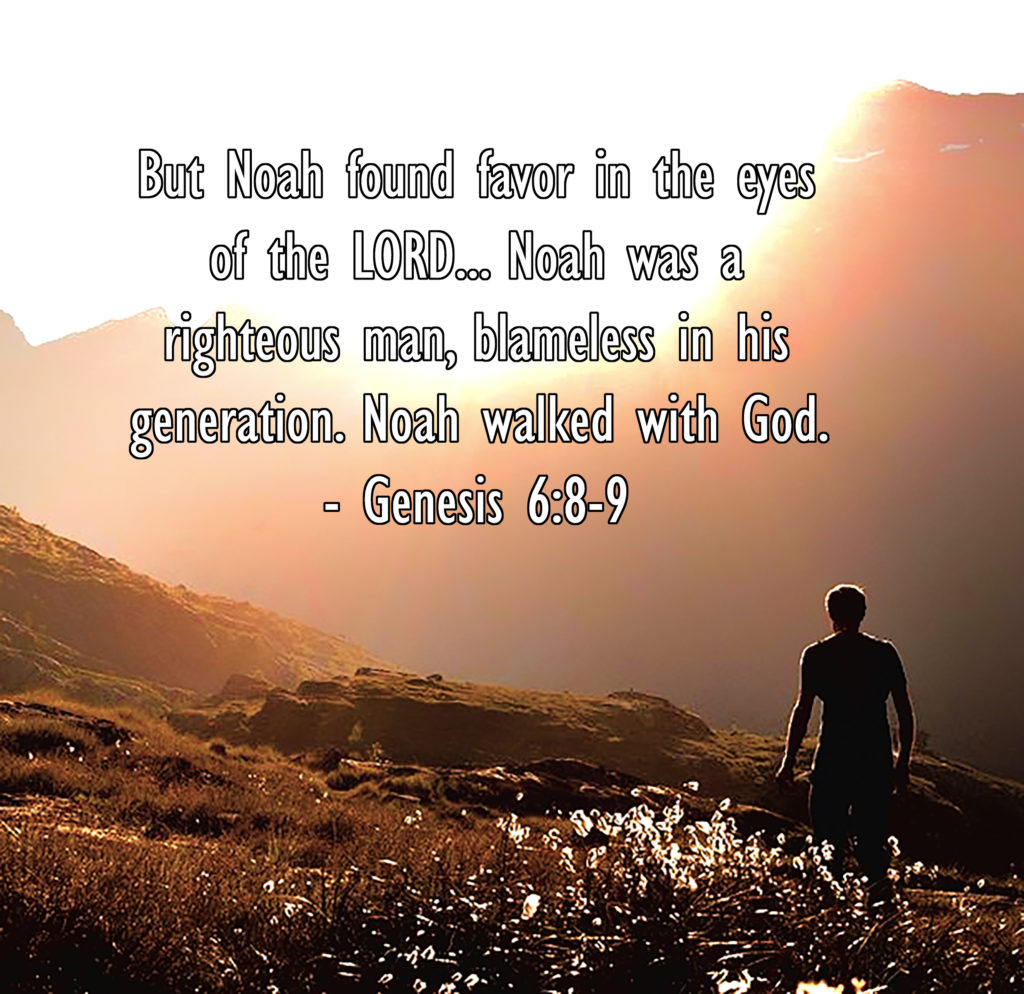
1 When man began to multiply on the face of the land and daughters were born to them, 2 the sons of God saw that the daughters of man were attractive. And they took as their wives any they chose.
Coming off of the first of several genealogies, as a prologue to the flood narrative, Scripture records an interesting occurrence, where “the sons of God” married the “daughters of man.” There is some debate as to what this actually means. However the only other times where the phrase “sons of God” is used in the Old Testament, it is used to describe spiritual beings. By that understanding, spiritual beings were having intimate relationships with human beings.
3 Then the LORD said, “My Spirit shall not abide in man forever, for he is flesh: his days shall be 120 years.”
Seemingly because of this unnatural union between spirit and human, an possibly for other reasons, as we have already seen that the descendants of Cain were becoming increasingly violent, God decides to limit the age of mankind to 120 years, a far cry shorter than the average of 900 years old that Noah’s ancestors lived to. While there are some people after the flood who do live longer than 120 years, the general rule is that human life is being shortened drastically.
4 The Nephilim were on the earth in those days, and also afterward, when the sons of God came in to the daughters of man and they bore children to them. These were the mighty men who were of old, the men of renown.
Returning to the description of the sons of God having children with the daughters of man. The text gives a brief description of these offspring, calling them “Nephilim” a term later associated with gigantism. The word may also be related to the Hebrew term naphal or “fallen ones” suggesting that the spirits who helped beget these giants were in fact demons, or fallen angels.
The text also indicates that some of these giants were also alive after the flood, perhaps becoming the ancestors for famous giants mentioned later in Scripture, such as Goliath.
5 The LORD saw that the wickedness of man was great in the earth, and that every intention of the thoughts of his heart was only evil continually. 6 And the LORD regretted that he had made man on the earth, and it grieved him to his heart. 7 So the LORD said, “I will blot out man whom I have created from the face of the land, man and animals and creeping things and birds of the heavens, for I am sorry that I have made them.”
Mankind had fallen to the point where they hardly resembled the beings God created. They had become wicked and evil, with purely sinful desires. This evil is so blatantly obvious that God actually regrets ever making mankind. He decides to destroy everything and start over. The phrase “blot out” is the same used to wash away something with water, implying the means of God’s judgement, a flood.
8 But Noah found favor in the eyes of the LORD.
Amidst all the evil and wickedness in the world, the world that God intends to destroy, He finds one person that keeps Him from completely destroying everything and everyone. God chooses to work through Noah, although He is by no means obligated to do so. It is simply that Noah found favor in God’s grace, that God ends up sparing him.
9 These are the generations of Noah. Noah was a righteous man, blameless in his generation. Noah walked with God. 10 And Noah had three sons, Shem, Ham, and Japheth.
We see now the third “these are the generations of…” statement in Genesis. This one provides the official beginning of the flood narrative. It begins with a description of Noah’s character and his family. Noah, although not perfect, is described as being far better than the rest of humanity. However it is the statement “Noah walked with God,” that stands out. Noah, like his great-grand-father, Enoch, who was taken up to heaven and did not experience death, walked with God. To this point, Scripture has only named 4 people who “walked with God”: Adam and Eve (before the fall), Enoch, and now Noah. This is why Noah found favor with God, because rather than be influenced by all the wickedness around him, Noah decided to follow God.
We will look more into Noah’s sons when we discuss the “table of nations,” in chapter 10.
11 Now the earth was corrupt in God’s sight, and the earth was filled with violence. 12 And God saw the earth, and behold, it was corrupt, for all flesh had corrupted their way on the earth.
Again the narrative described the dismal state of the world, this time focusing on violence as the main sinful behavior. Notice how the text described the earth as corrupt. It is like describing a disease, the sin of mankind had infected and corrupted the entire earth.
13 And God said to Noah, “I have determined to make an end of all flesh, for the earth is filled with violence through them. Behold, I will destroy them with the earth.
God warns Noah that he is going to wipe out the corruption, specifically the corruption of mankind. He tells him that he is going to destroy both mankind and the earth.
14 Make yourself an ark of gopher wood. Make rooms in the ark, and cover it inside and out with pitch. 15 This is how you are to make it: the length of the ark 300 cubits, its breadth 50 cubits, and its height 30 cubits. 16 Make a roof for the ark, and finish it to a cubit above, and set the door of the ark in its side. Make it with lower, second, and third decks.
God tells Noah how to build the means of his family’s salvation. He is to build an ark (literally a “box”), according to the descriptions God gives. With a cubit being about 18 inches, or 1.5 feet, its dimensions would be 450 feet long by 75 feet wide, by 45 feet tall, or roughly the size of a modern cargo ship. In 1993, a study was conducted by Dr. Seon Hong in Korea to see if the dimension given for the ark actually made for a good seafaring vessel. According to the study, not only was the ark suitable for sea travel, the dimension given in the Bible were by far the best design for a strong, stable, and comfortable travel over rough waters. (Source: https://answersingenesis.org/noahs-ark/thinking-outside-the-box/)
17 For behold, I will bring a flood of waters upon the earth to destroy all flesh in which is the breath of life under heaven. Everything that is on the earth shall die.
Here God explains just how He is going to destroy the earth, with a flood of waters. Now this is the first point the Bible ever mentions a flood, or anything related to rain at all. While Noah would obviously know what water is, there is some question as to weather or not he would have understood what a flood, or even rain was. Especially not at the scale God was describing.
18 But I will establish my covenant with you, and you shall come into the ark, you, your sons, your wife, and your sons’ wives with you. 19 And of every living thing of all flesh, you shall bring two of every sort into the ark to keep them alive with you. They shall be male and female. 20 Of the birds according to their kinds, and of the animals according to their kinds, of every creeping thing of the ground, according to its kind, two of every sort shall come in to you to keep them alive. 21 Also take with you every sort of food that is eaten, and store it up. It shall serve as food for you and for them.”
God describes how the flood will save Noah and his family, as well as the entire animal kingdom. He is to take at least two of every animal, so that the earth can be repopulated after the flood subsides. He is also to be well prepared with food for his family, as well as for all the animals.
Now, there are a lot of animals in the world, with over 6.5 million different species of animals on land alone. Because of this, some question if Noah would of had room for two of every species of animal even with the ark the size that it is. However God does not specify species, but rather two of every “sort” or “kind” of animal, and he does not say that the animals have to be full grown. For example there are an estimated 350 different species of elephants in the world today, but Noah would have likely only needed two young (not fully grown) elephants. If this logic were applied to the entire animal kingdom, then the ark would only need to carry an estimated16,000 individual animals, and likely had room for twice as many. The various species of animals would then likely develop over time after the flood.
22 Noah did this; he did all that God commanded him.
Noah listened to God. He did what God commanded and built the ark. This was a massive project, and likely took a long time. According to some Jewish traditions, Noah actually had to plant the trees used as wood for the ark, tend them as they grew, then build the ark and gather the animals. It was a long process and likely took Noah close to 100 years to complete. It was likely that people mocked him for building the ark, for wasting so much time. Noah endured and listened to God rather than the ridicule of his neighbors.
